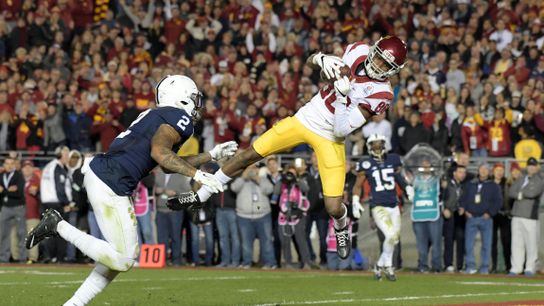With the season rapidly approaching, the next major domino to fall in college football is not the outcome of the Oregon-Georgia Week 1 game, the Texas-Alabama game in Week 2, or any other on-field contest. It's the particulars of the coming Big Ten TV deal.
On Thursday, Front Office Sports reported the Big Ten expects to top $1.5 billion per year with its next set of TV contracts. Fox is already heavily involved in the negotiations. In fact, as the majority owner of BTN, Fox is sitting in on the negotiations with other networks, reviewing how much its rivals want to pay for Big Ten rights and what games they expect to get in exchange. Imagine Michigan's offensive staff sitting in on an Ohio State defensive meeting.
Nevertheless, a league that stretches from East Coast to West Coast -- with brands like Michigan, Ohio State, Penn State and Nebraska in between -- is a premier property for any network, and companies besides Fox are lining up for a piece. In fact, on Wednesday FOS reported NBC and CBS could be in line to join. CBS lost its 3:30 ET SEC Game of the Week to ABC/ESPN, and could fill that hole with Big Ten games. Additionally, NBC is said to eye a primetime package, the Saturday night version of its highly successful Sunday night NFL games. (This would all be in addition to the existing Fox Big Noon Kickoff, which will become all B1G once the Red River Rivals leave the Big 12.)
Commissioner Kevin Warren said at Big Ten media days the league expects to have the deals finalized "sooner than later." Industry insiders expect them by Labor Day.
As a result, Dennis Dodd of CBS Sports reported the Big Ten has decided against expanding at this current time. He writes:
After the anxiety caused last week regarding further Big Ten expansion, industry sources have indicated the Big Ten is no longer as interested in adding California, Oregon, Stanford and Washington. Rightsholders were balking at paying the same amount for those schools as the 16 Big Ten schools going forward ($80 million-$100 million in total revenue).
The logic follows. If the Big Ten wanted Oregon, Washington, Stanford or Cal.... they'd be in the Big Ten right now. It's no secret the conference covets Notre Dame as a 17th member, and I wrote last week that Stanford would make the most sense as a hypothetical 18th member, Notre Dame will join a conference at proverbial gunpoint, and not one moment before. If NBC pays them enough to remain independent, and the College Football Playoff allows an independent Notre Dame to reach the field, it's expected Notre Dame will remain independent.
FOS's numbers anticipate USC and UCLA grew the Big Ten's media rights by 50 percent, thereby putting money in the existing 14 schools' collective pockets. Oregon, Washington, Cal and Stanford -- while fine schools on their own -- wouldn't do that.
And so the focus now moves to the Pac-10. The conference is actually in its exclusive negotiating window with ESPN and Fox right now. However, industry insiders believe the conference is in a holding pattern to see what network inventory is left over after the Big Ten has eaten to its satisfaction. If ESPN does not pick up Big Ten rights, the Pac-10 is likely fine, with Pac-10 After Dark becoming the lifeboat that keeps the conference afloat. If the Big Ten manages to strike a deal with NBC, CBS and ESPN, that'd be bad news in the Pac-10's remote headquarters.
As a result, things have become contentious between the Pac-10 and Big 12.
https://t.co/065gVaA3GP pic.twitter.com/GkjvjiIWSr
— Big 12 Conference (@Big12Conference) August 3, 2022
Rather than join forces as a 24-team entity with teams in all four time zones, the conferences have done the typical college sports thing and opted to fight to the death to be FBS's distant No. 3 league behind the SEC and Big Ten.
The Big 12 believes it is better positioned to survive, but the Pac-10 has the advantage in that it's next up to bat behind the Big Ten. The Pac-10's deals with ESPN and Fox expire in 2024, while the Big 12's deals with the same two networks don't expire until the following year.
